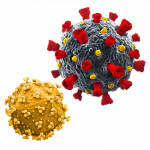As many as three-quarters of people who recover from Covid-19 report experiencing at least one lingering symptom six months later. Common symptoms of this condition, known as PACS (for “post-acute coronavirus syndrome”) or “long Covid,” include fatigue, muscle weakness, and insomnia.
The exact cause of long Covid remains a mystery, but possible contributory factors are excessive immune responses and cell damage sustained during the illness itself. It also remains unclear why some people who have had Covid-19 experience lingering symptoms for weeks or months while others recover completely.
Researchers at the Center for Gut Microbiota Research, part of the Chinese University of Hong Kong, think they may have found a clue.
They discovered that people with Covid-19 had distinct changes in their gut microbiota, the community of microorganisms living in their gut, compared with healthy controls. (The collection of genomes of the gut microbiota is known as the gut microbiome.)
Fecal samples from people with Covid-19 contained more opportunistic pathogens or disease-causing organisms and fewer “friendly” bacteria.
This disruption in the balance of organisms living in the gut, known as gut dysbiosis, appeared to be more extreme in people with more severe illness.
Fecal samples from people with Covid contained more opportunistic pathogens or disease-causing organisms-- and fewer “friendly” bacteria.
Because the gut plays a major role in the regulation of the immune system, disturbances in the gut microbiota may not only exacerbate Covid-19 but also cause lingering symptoms as a result of continuing immune disturbances.
The Center for Gut Microbiota Research has now found the first evidence of gut dysbiosis in people with long Covid up to six months after their initial Sars-CoV-2 infection. The scientists found links between specific groups of bacteria and particular symptoms.
At the time of hospital admission, people who went on to develop long Covid tended to have a less diverse and abundant microbiome compared with people who fully recovered. In fact, the gut microbiome of people who did not develop long Covid was similar to that of a group of healthy controls who provided fecal samples before the pandemic. The results of the study appear in the journal Gut.
How the Study Was Conducted
The scientists recruited 106 people with Covid-19 admitted to hospitals in Hong Kong. Most had mild to moderately severe Covid-19. Their average age was 48 years, and just over half were women.
The participants gave stool samples on admission, one month later, and six months later. The researchers used a technique called shotgun metagenomic sequencing to analyze a total of 258 samples. They also analyzed control samples provided before the pandemic by 68 people matched for age, sex, preexisting illness, and diet.
Following their discharge from the hospital, 81% of people still had at least one lingering symptom three months later. After six months, 76% still had a symptom. The most common symptoms were fatigue, memory difficulties, hair loss, anxiety, and sleep disturbances.
Interestingly (and in contrast to reporting from other research centers), the team found no association between the amount of virus (viral “titers”) in the samples provided to the hospital at admission and whether participants went on to develop long Covid. There were, however, significant links between the participants’ gut microbiome and the condition.
Interestingly, the team found no association between viral titers upon hospital admission and the risk of going on to develop long Covid.
In people with long Covid, there were differences in the abundance of 42 species of bacteria at admission and three and six months following discharge compared with control samples. Of these, 28 species were less abundant, and fourteen were more abundant.
For example, at six months, people with long Covid had significantly less of the friendly species Faecalibacterium prausnitzii and Blautia obeum in their guts. They also had a greater abundance of the “unfriendly” species Ruminococcus gnavus and Bacteroides vulgatus.
Friendly bacteria that produce the chemical butyrate, such as Bifidobacterium pseudocatenulatum and F. prausnitzii, were the most likely species to be depleted in people with long Covid six months after discharge.
By contrast, people who did not develop long Covid had only 25 changes in the abundance of species at hospital admission compared with controls. And by six months after discharge, their gut microbiomes were similar to that of the controls.
The researchers also found links between certain species and particular symptoms of long Covid, for example, respiratory symptoms correlated with disease-causing opportunistic bacteria. Neuropsychiatric symptoms and fatigue were associated with nosocomial or hospital-acquired species such as Clostridium innocuum and Actinomyces naeslundii.
“Our study demonstrated the association between [a persistently] altered gut microbiome and long Covid, which also suggests that there is an opportunity to ameliorate these symptoms by regulating the gut microbiome,” said Siew Ng, PhD, associate director of the Center for Gut Microbiota Research and senior author of the new study.
"There are important implications for future research regarding the mechanisms of disease underlying long Covid," she continued, "as well as for the development of better diagnostic approaches and potential therapies– because almost no one is looking at the gut.”
“Friendly” Bugs As Immuno-regulatory
Professor Graham Rook, MD, an emeritus professor of medical microbiology at University College London, who was not involved in the research, explained: “It is entirely reasonable to suggest that the composition of the organisms in the gut might be relevant to the development of long Covid. One particularly probable link is via regulation of the immune system.” (People with long Covid often have raised levels of auto-antibodies.)
In the study, people with long Covid had reduced levels of several gut bacteria that help regulate the immune system: the aforementioned F. prausnitzii, Eubacterium rectale, and bifidobacteria species. Professor Rook formulated the “old friends hypothesis,” which proposes that humans evolved friendly relationships with bacteria that help keep the immune system in check.
There is, of course, the (strong) possibility that what the Hong Kong research team observed does not lend itself to therapeutic inverventions after the fact; that is, given that Sars-Cov-2 preferentially infects epithelial cells expressing the ACE2 receptor (a smorgkasbord of which is offered by the cells of the gut lining), any helpful/harmful microbial ecosystem in the gut might very well serve only to “referee” the inflammatory havoc. Once the damage is done (and post-acute coronavirus syndrome/long Covid symptomology established), any efforts to modify or improve the good:bad microbial balance in favor of helpful microbes would do nothing to reverse processes already underway.
Be that as it may, clinical trials are already in the works that would investigate the use of probiotics (think “bugs as drugs”), dietary changes (think prebiotics), and even fecal transplants as potential treatments. A more detailed discussion of this (several, actually) is planned for the 2022 gathering of some of the country’s most forward-thinking clinicians: the Integrative Healthcare Symposium-- at the New York Sheraton next week.
And if by chance your curiosity has been piqued, and you’ve caught yourself wondering just what might be the composition and relative balance of good bugs/bad bugs and the in-between within you, there is a short (but not necessarily breezy) discussion of current sort of DIY testing methods available to the public at this link. This is a far cry from your Quest or LabCorp “O&P” though.
I have used GI Effects, CDSA (Comprehensive Digestive Stool Analysis) and GI-MAP satisfactorily, but Dr. Polland’s observations, caveats and criticisms here I find completely valid.
Digestive stool (and even more so, microbiota; some would say, technically incorrectly, “microbiome”) testing is really kind of an “down the rabbit hole” undertaking, and trying to master the in’s and out’s of it could easily consume a lifetime of questioning, learning, and PhD level research!
Mike Barr, a longtime Poz Contributing Editor and founding member of and scribe for the Treatment Action Group (TAG), is a functional medicine practitioner and herbalist in NYC. Reach out to him here.
Feel free too to sign up for his curated (and generously discounted) professional grade supplement store. The site boasts both his current personal favorites— Quicksilver Scientific, Biocidin, Microbiome Labs, Metagenics— as well as stalwarts, Apex Energetics, Biotics Research, Nordic Naturals, Standard Process/MediHerb, Douglas Labs, Pure Encapsulations, Thorne, Designs For Health and others.








Comments
Comments